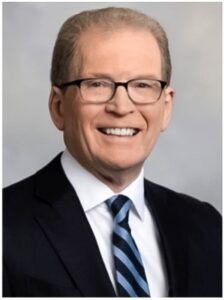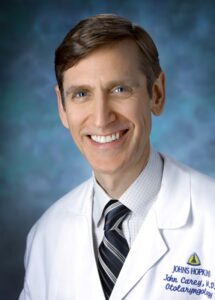 LLOYD B. MINOR, M.D., is a scientist, surgeon, and academic leader. He is the Carl and Elizabeth Naumann Dean of the School of Medicine and Vice President for Medical Affairs at Stanford University. Dr. Minor is also a professor of Otolaryngology–Head and Neck Surgery and a professor of Bioengineering and of Neurobiology, by courtesy, at Stanford University.
LLOYD B. MINOR, M.D., is a scientist, surgeon, and academic leader. He is the Carl and Elizabeth Naumann Dean of the School of Medicine and Vice President for Medical Affairs at Stanford University. Dr. Minor is also a professor of Otolaryngology–Head and Neck Surgery and a professor of Bioengineering and of Neurobiology, by courtesy, at Stanford University.
Before joining Stanford in December 2012, Dr. Minor was provost and senior vice president for academic affairs at Johns Hopkins University. Prior to this appointment in 2009, Dr. Minor served as the Andelot Professor and director of the Department of Otolaryngology–Head and Neck Surgery at the Johns Hopkins University School of Medicine and otolaryngologist-in-chief of the Johns Hopkins Hospital.
With more than 160 published articles and chapters, Dr. Minor is an expert in balance and inner ear disorders, perhaps best known for discovering superior canal dehiscence syndrome, a debilitating disorder characterized by sound- or pressure-induced dizziness. He subsequently developed a surgical procedure that corrects the problem and alleviates symptoms. In 2012, Dr. Minor was elected to the National Academy of Medicine.
Dr. Minor is the Chair of the Board of Directors for the Alice L. Walton School of Medicine in Bentonville, AR.
Held by John Carey
 JOHN CAREY, M.D., is the inaugural Professor and Director of the Lloyd B. Minor, M.D. Center for Vestibular and Skull Base Sciences in Otolaryngology-Head and Neck Surgery at the Johns Hopkins University School of Medicine. Dr. Carey earned his M.D. from Washington University School of Medicine in St Louis, MO in 1991. He completed a residency in general surgery at Virginia Mason Medical Center in 1993 and an otolaryngology residency in 1998 at University of Washington Medical Center, both in Seattle, WA. Dr. Carey completed a fellowship in neurotology in 2000 at Johns Hopkins. He joined the faculty at Johns Hopkins in that same year. Dr. Carey is certified in both otolaryngology and neurotology by the American Board of Otolaryngology-Head and Neck Surgery.
JOHN CAREY, M.D., is the inaugural Professor and Director of the Lloyd B. Minor, M.D. Center for Vestibular and Skull Base Sciences in Otolaryngology-Head and Neck Surgery at the Johns Hopkins University School of Medicine. Dr. Carey earned his M.D. from Washington University School of Medicine in St Louis, MO in 1991. He completed a residency in general surgery at Virginia Mason Medical Center in 1993 and an otolaryngology residency in 1998 at University of Washington Medical Center, both in Seattle, WA. Dr. Carey completed a fellowship in neurotology in 2000 at Johns Hopkins. He joined the faculty at Johns Hopkins in that same year. Dr. Carey is certified in both otolaryngology and neurotology by the American Board of Otolaryngology-Head and Neck Surgery.
Dr. Carey is internationally recognized as a clinician-scientist who has made important contributions to our understanding of the function and diseases of the inner ear balance organs. His work has been funded through the National Institutes of Health/National Institutes on Deafness and Communication Disorders. Dr. Carey’s research has demonstrated the effects of gentamicin on the inner ear as used in the treatment of Meniere’s disease. His current research focuses on the mechanisms, proper diagnosis, and treatment of superior canal dehiscence syndrome, which was discovered at Johns Hopkins by his mentor, Dr. Lloyd Minor. Dr. Carey runs a busy clinical practice serving patients from all over the world who come to Johns Hopkins for his expertise with this syndrome. He considers it the highest privilege to be able to provide solutions for patients with a disabling disorder while continuing investigations to better understand the workings of the vestibular system and the profound effects that a repairable disorder has on the brain and health. In addition, Dr. Carey is a co-investigator with Dr. Charles C. Della Santina, PhD, MD, of the novel Multichannel Vestibular Implant in a first-in-humans clinical trial. Other partnerships with biomedical engineering colleagues at Johns Hopkins aim to better understand how patients with vestibular disorders move about in the world. In particular, they hope to detect subtle abnormalities in patterns of movement that may be diagnostic. Another focus of his research is studying the mechanisms of vertigo and migraines, specifically the role of inflammatory molecules in triggering vertigo. Progress on this front could provide the first solid foothold in understanding why migraine is so commonly associated with vertigo. Dr. Carey hopes that it would also open new avenues for diagnostic testing for vestibular migraine and the use of novel pharmaceutical treatments for the disorder.
Dr. Carey has also been recognized for his teaching, having served for many years as the neurotology fellowship director and the lead lecturer to the medical students on the vestibular system. He has been given a teaching award from the Department of Otolaryngology-Head and Neck Surgery as well as induction into the Distinguished Teaching Society at the Johns Hopkins School of Medicine.
Dr. Carey has authored or co-authored over 150 peer-reviewed publications and has served as President of the Association for Research in Otolaryngology and the American Otological Society. He has also served the National Institutes of Health on the National Deafness and Other Communication Disorders Advisory Council, and as a Director of the American Board of Otolaryngology-Head and Neck Surgery.
 LLOYD B. MINOR, M.D., is a scientist, surgeon, and academic leader. He is the Carl and Elizabeth Naumann Dean of the School of Medicine and Vice President for Medical Affairs at Stanford University. Dr. Minor is also a professor of Otolaryngology–Head and Neck Surgery and a professor of Bioengineering and of Neurobiology, by courtesy, at Stanford University.
LLOYD B. MINOR, M.D., is a scientist, surgeon, and academic leader. He is the Carl and Elizabeth Naumann Dean of the School of Medicine and Vice President for Medical Affairs at Stanford University. Dr. Minor is also a professor of Otolaryngology–Head and Neck Surgery and a professor of Bioengineering and of Neurobiology, by courtesy, at Stanford University.  JOHN CAREY, M.D., is the inaugural Professor and Director of the Lloyd B. Minor, M.D. Center for Vestibular and Skull Base Sciences in Otolaryngology-Head and Neck Surgery at the Johns Hopkins University School of Medicine. Dr. Carey earned his M.D. from Washington University School of Medicine in St Louis, MO in 1991. He completed a residency in general surgery at Virginia Mason Medical Center in 1993 and an otolaryngology residency in 1998 at University of Washington Medical Center, both in Seattle, WA. Dr. Carey completed a fellowship in neurotology in 2000 at Johns Hopkins. He joined the faculty at Johns Hopkins in that same year. Dr. Carey is certified in both otolaryngology and neurotology by the American Board of Otolaryngology-Head and Neck Surgery.
JOHN CAREY, M.D., is the inaugural Professor and Director of the Lloyd B. Minor, M.D. Center for Vestibular and Skull Base Sciences in Otolaryngology-Head and Neck Surgery at the Johns Hopkins University School of Medicine. Dr. Carey earned his M.D. from Washington University School of Medicine in St Louis, MO in 1991. He completed a residency in general surgery at Virginia Mason Medical Center in 1993 and an otolaryngology residency in 1998 at University of Washington Medical Center, both in Seattle, WA. Dr. Carey completed a fellowship in neurotology in 2000 at Johns Hopkins. He joined the faculty at Johns Hopkins in that same year. Dr. Carey is certified in both otolaryngology and neurotology by the American Board of Otolaryngology-Head and Neck Surgery.